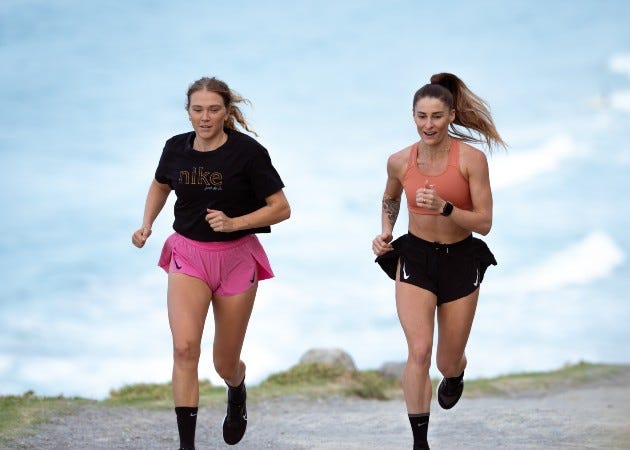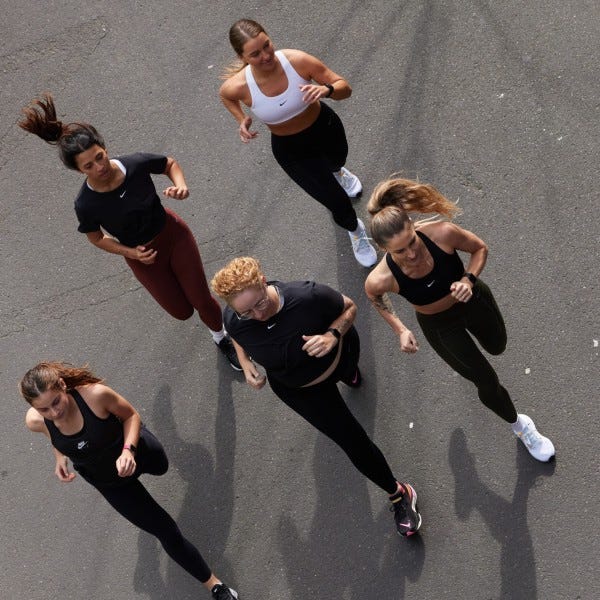Competing in a man’s world
Lydia’s business is built by women, for women, and focused on the female body. That means some investors struggle to connect to the problem… and the size of the opportunity. Welcome to The Club.
“As a woman, when you’re successful, or you have the opportunity to speak up or have a crack, you feel like you have to be so grateful to everyone.
“But the world is fucking lucky that I’m there, that I’m speaking and that I’m taking up room.”
TW: This article touches briefly on disordered eating and abusive behaviour in the context of athletics training.
Lydia O’Donnell has gone from elite athletics to heading a tech startup. In both worlds, she tapped into passion and determination; in both worlds, hard work meets hope, and doing what you love.
But in both worlds, Lydia and co-founder Esther Keown have also faced barriers, flawed advice and outright discrimination. Now, on behalf of all women, they’re setting out to turn both worlds upside down.

Lydia has always been a runner. She trained throughout her teens, and won her first national title in New Zealand at 19. From there, her professional, high-performance athletics career kicked off.
“The sporting system, very much like the tech and startup world, has been built by men for men,” Lydia explains.
“I was being treated like one of the boys in the team — my coach took the same approach to my training and the way he spoke to me, without really realising that, because of my physiology and my hormones, I’m a very different human being.”
For female athletes, there is not only the pressure to run further and faster, there’s pressure to look a certain way while you’re doing it. The assumption is that a leaner athlete is a faster athlete, Lydia explains.
“I was constantly being told to lose weight.”
It wasn’t only comments. Lydia’s coaches would physically grab her body, to ‘show’ her what she needed to lose. She was placed on diet supplements when she weighed little more than 50kg.
“I kind of spiralled. I went into five years of losing confidence in myself, huge body image issues, disordered eating behaviours, and beating myself up constantly.”
Today, Lydia recognises those experiences as “horrific”, she says.
“But I’m a really competitive person. At the time, I was committed to being an athlete,” she adds.
“I thought sacrificing my health and my mental health was just part of it.”
“My body and health crumbled”
When Lydia lost her menstrual cycle, she took it as a sign she was doing something right.
In a male-dominated space, periods were seen as a nuisance and an inconvenience. If they were gone, that was one less thing to worry about.
But three months later, after not fuelling her body adequately for years, she was hospitalised.
“My body and my health just crumbled.”
Throughout a long recovery, Lydia reassessed her relationship with running and started learning about her body for the first time.
“There is a huge lack of education in sport around female physiology,” she explains.
Only 6% of sports science research is conducted on female bodies. And, needless to say, the menstrual cycle in particular has been completely ignored to date.
“The way we’ve learnt how to train, how to adapt our training, how to fuel and how to recover, it’s all been built on flatlined testosterone,” Lydia says.
“It has not been built on the fluctuation of female hormones that change every single day.”
Lydia started to put her learnings into practice, coaching and writing training plans for other women.
Later, she teamed up with her friend and fellow runner, Esther, who had had a very similar experience with professional athletics training. And together, they brought Femmi to life.
The app offers training plans tailored to personal goals, varying abilities and individual hormonal cycles, allowing Lydia and Esther to share their knowledge at scale, and change what training looks like for female bodies.
“We’ve evolved into an app where we can reach millions of women around the world through in-depth programming and guidance, based on their physiology.”
A world built by men, for men
As a women-led startup with a focus on the female body — the menstrual cycle no less — it will come as little surprise that Lydia and Esther have come up against some challenges in the tech space.
They’ve been offered unsolicited and contradictory advice. They’ve seen millions in funding go to male-led businesses purporting to solve problems for women. They’ve been told to be more ambitious… and to be more realistic in their goals.
They’ve also been told they will never succeed without a technical co-founder.
“I don’t know if that’s gender specific,” Lydia muses. “But I can’t help feel like it is.”
Especially when it comes to fundraising, the thread that runs through every interaction is that Femmi solves a problem only people who menstruate can understand.
“Someone who has never experienced these challenges will never be able to relate to them,” Lydia explains.
“They can sit there and nod and tell us we’re doing a good job and give us a pat on the back. We get that a lot,” she adds.
“But they will never actually understand the problem, so they underestimate how much of a problem it is, and they underestimate the opportunity in front of them.”
To Lydia, Esther and probably about 50% of the global population, the challenge Femmi is addressing is a blindingly obvious one.
Femmi does have some men on its cap table. But too often, in pitches and investor meetings, the opportunity is not taken at face value. The founders are asked to explain and re-explain the numbers, the market size, the opportunity.
“We have a male team member who is also a founder,” Lydia notes.
“He’s shocked by how many questions we’re asked and how much data we have to provide, compared to when he built his company with another man.”
When men can’t connect on an emotional level, they have to connect on a financial one, Lydia explains. That means the bar is higher.
“It’s frustrating. It’s sacrificing energy and time that we could just be putting into Femmi and building our company the way we know it needs to be built.”
Proud to take up space
Despite everything she experienced as a professional athlete, Lydia hasn’t lost any love for running. It’s her go-to for coping with the stresses of her startup, and it’s how she processes a tough day or a baffling interaction.
“When you strip the challenges away, the actual act of running can be so powerful, and can make you feel so good,” she says.
In many ways, the same goes for the startup journey. Strip back the challenges, and it’s the core mission, the impact, and the user feedback that keeps her going.
Lydia isn’t one to complain or feel sorry for herself. She’s found parallels between these two worlds — positive and negative — so she’s flipping the script on both.
She’s done feeling lucky or grateful for her seat at the table, and she’s done feeling guilty for taking up space.
“As a woman, when you’re successful, or you have the opportunity to speak up or have a crack, you feel like you have to be so grateful to everyone for their time,” she says.
“But the world is fucking lucky that I’m there, that I’m speaking and that I’m taking up room.”
It’s investors who should be thanking Lydia, she says.
“You would be fucking lucky to have a piece of the pie at Femmi. Our team works harder than anyone, and we have made so many sacrifices to be here. You are going to benefit off of that if you invest,” she adds.
“It should be like that for all women. We don’t give ourselves enough credit, and that’s not our fault, but we need to be more proud and confident in the spaces that we are taking up.”
Ultimately, Lydia wants to take the money she makes from Femmi and invest into more women founders making their own impact.
The more women we have running successful tech companies, the more equitable the sector will become, and the more we can move the needle on the gender imbalance in tech.
“I’m excited about the future because I know there are so many amazing women who are building it,” she says.
“They just need more opportunity to do so.”
If Lydia’s story resonates, join the conversation…
If you’re comfortable sharing, we would love to hear your perspectives in the comments.
Know someone who needs to read this article?
Hit that forward button and share this newsletter with your business besties.
Join the club
Subscribe for a fortnightly tell-all from the entrepreneurial and startup sphere. Because it feels so good to share, doesn’t it?
Who are we?
We’re Marie Dowling and Stef Palmer-Derrien, two business buddies navigating the tech, startup and small biz world with toddlers in tow.
👸🏻 Stef Palmer-Derrien is a freelance writer, journalist and word person, specialising in startups, tech and small business. Stef is also the co-founder and editor of The Club as well as media advisor at Newsary.
Stef is a parent to a two-year-old wrecking ball of a child, and also a dog who has absolutely no chill.
👸🏼 Marie Dowling is the other brain behind The Club and a self-proclaimed startup town crier. As the founder of PR startups Newsary and EzyCom, she is committed to democratising PR to share all the stories that make our world move.
She’s also la maman to a beautiful two-year-old and an Australian bulldog who does nothing but chill.






